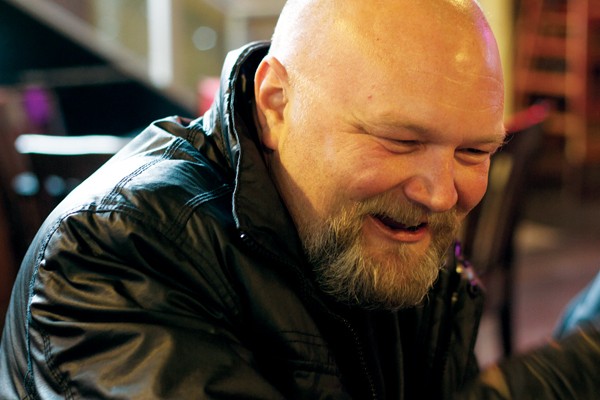Tyler Keith is a rocker.
The Pensacola, Florida, native says his musical education started with playing bluegrass with his father. “I remember seeing Bill Monroe as a kid, and it made an extreme impression on me. It was the intensity of the performance,” Keith said.
But when he was about 13 years old, an older kid introduced Keith to the Who: “I wanted to be Pete Townsend. I didn’t give a shit about bluegrass anymore.”
In 1990, he landed in Oxford, Mississippi, to attend Ole Miss. “I grew up going to all-age punk rock shows,” Keith said. “Coming to that culture, you’re going to juke joints when you’re 18, hearing the blues for the first time, it’s pretty fucking mind blowing.”
 Laura Jean Hocking
Laura Jean Hocking
Tyler Keith
Keith studied writing with Barry Hannah and joined garage punkers the Neckbones. “I was kind of on the outside of everything,” Keith said. “It was not a bad thing to be on the outside. We had a good crowd here in Oxford.”
When the Neckbones started touring, their first stops were in Memphis at the legendary Antenna club and its downtown sibling, Barristers. “I was already going to shows [in Memphis], and seeing so many great bands, like the first incarnation of the Compulsive Gamblers.”
The Simpletones, featuring Shangri La’s Jared McStay and Lucero’s Roy Berry, helped them record their first single: “There’s something about that town. At night, in Midtown, it’s almost like a film noir set. We played a lot of shows for a long time with only a handful of people there. They were people I really liked and admired, like Jack Oblivian, Jeff Evans, and Eric Freidl.”
After the Neckbones, Keith kept going as a solo act, fronting both the Preacher’s Kids and the Apostles. He became a legendary live performer, almost always the best thing on the bill, even when he was a last-minute replacement act on a Goner Fest Friday night.
“I just love to play,” Keith said. “Time stands still. You live in the second. Performing is the greatest feeling, and that’s something you don’t have with other art forms. You can write and record an album. You can make a film, you can write a book. But you can’t perform that stuff. It’s the performance aspect of music that’s hard to get away from, even if you want to. How many times have I quit? I went back to school, got a master’s degree, I was going to go do this other stuff. But it’s addictive, that feeling.”
Keith’s new album, Alias: Kid Twist, his 10th, is a departure from his usual sound: “I wanted to consciously make an all-acoustic record – the only electric things are the microphones.”
Keith adopted the name Kid Twist to play solo in Oxford.
“It had an immediate effect on the way I was writing songs,” Keith said. “I started writing more on acoustic guitar. It made me reconnect with some of the more folk roots that I had. I’ve always loved those early ’60s [Bob] Dylan records.”
Another change happened when a friend moved an old upright piano into Keith’s house. “My dad could play one song on piano: ‘What I Say’ by Ray Charles,” Keith said. “I learned a bastardized version of that from him. Then I kind of figured out from that the rudiments of the Jerry Lee barrelhouse style.”
For the recording, producer Andrew Ratcliff acquired two vintage ’50s microphones from Columbia Studios.
“We set it up basically like they would have done it back then: one mic on the guitar, one on the vocals, and then a room mic. We recorded most of it live. It was a lot scarier in a studio than it usually is in front of an audience, to tell you the truth.”
The album has a warm, immediate sound, but it retains Keith’s volcanic energy. On songs like “I Guess We Really Don’t Have that Much to Lose,” he shows off a rich baritone. But on acoustic reinterpretations of older Keith numbers, such as “Be Sure Your Sins,” his familiar throat-shredding screams propel the lyrics.
Keith has pursued writing and even created a rock musical, The Outlaw Biker, but it’s playing live that excites him most. “It’s in our DNA,” he says, recalling a moment from the documentary Cave of Forgotten Dreams where researchers recreated a Paleolithic flute. “This is a 30,000-year-old flute, and it’s still playing the pentatonic scale. It’s basically playing the blues.”